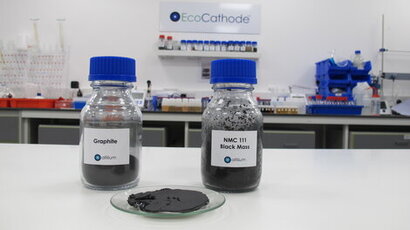
The partnership will help to embrace a circular economy and reduce the UK’s reliance on imported raw materials.
The collaboration marks a significant step towards securing a sustainable domestic source of graphite for the UK EV battery industry, and underscores both companies’ commitment to supplying automotive OEMs and battery manufacturers with low carbon battery materials.
Graphite is the largest single material in lithium-ion batteries, comprising up to 50 percent of a battery by volume. Altilium’s proprietary recycling process can recover over 99 percent of the graphite from end-of-life EV batteries, allowing these valuable resources to be returned to the supply chain, while Talga’s green anode production technology results in dramatically lower CO2 emissions from the making of EVs.
Under the agreement, the two companies will focus on optimising the recovery of graphite from battery waste to produce a battery-grade product for use in new anodes.
Until recently recycling of graphite was largely overlooked, with recyclers focused on reclaiming cathode metals from battery scrap. However, with a growing shortfall in graphite supply expected over the next decade and China (which refines over 90 percent of world’s graphite) recently announcing controls on exports, a shift towards self-sufficiency will be critical for the UK in order to meet the growing needs of new green industries.
According to forecasts by the Advanced Propulsion Centre, UK anode demand for graphite is forecast to reach 46,000 MT by 2027, growing to 95,000 MT by 2030. Altilium’s planned Teesside recycling plant will have capacity to recover 20,000 MT of graphite a year, enough to meet over 20 percent of UK demand by 2030.
Altilium is already recovering critical battery metals, including lithium, to produce cathode active materials (CAM) for direct reuse in the battery supply chain. With the recovery of graphite, the company will be able to recycle all the battery components, enabling full battery circularity.
“This breakthrough is a significant milestone in our journey towards a more sustainable and environmentally-friendly future for electric vehicle batteries” said Altilium President and COO Dr Christian Marston. “We look forward to working with Talga to build a domestic, sustainable supply chain for low carbon graphite in the UK and leading the shift towards self-sufficiency and energy security."
Altilium will supply Talga with graphite recovered from EV battery waste at its Battery Recycling Technology Centre (ACT 1) in Tavistock and new pilot plant in Plymouth (ACT 2), both in Devon. The 18,000-square-foot facility is scheduled to begin operations later in 2024, processing significant volumes of CAM and battery precursors for qualification with OEM’s and cell manufacturers.
Talga will use its patent pending chemical purification methods to generate high purity stock for the production of new anode active materials and also carry out testing of coin cell and single layer pouch cells. So far, testing of the recycled graphite has shown a good match to primary graphite in areas of purity and physio-chemical characteristics.
Altilium is also part of a recently announced £30 million collaborative project backed by the Advanced Propulsion Centre (APC) and led by Nissan. Altilium is working with Nissan Technical Centre Europe (NTCE) to process waste from spent Nissan Leaf batteries and production scrap to recover the graphite for reuse in new anodes, as well as upcycling cathode metals to high nickel CAM.
“The need to secure a long-term, localised anode supply is crucial for the EV battery market” added Talga Group CEO Mr Martin Phillips. “We are excited to work with Altilium in optimising the use of recycled graphite in active anode material to enable battery makers and automotive OEMs to reduce their CO2 footprint, and to support the industry’s end-of-life battery recycling targets.”
For additional information:

